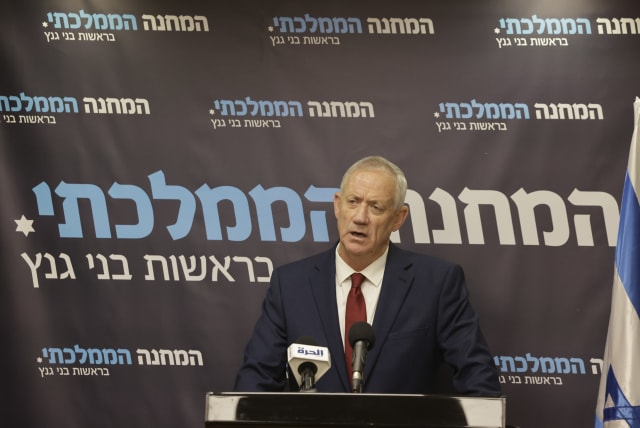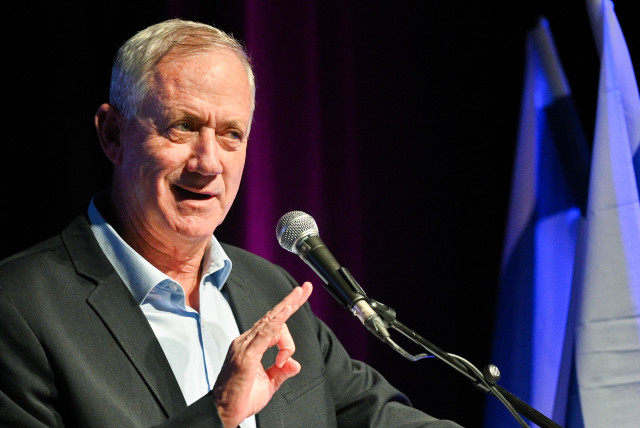Gantz: No progress has been made with judicial reform negotiations

The talks were "not really advancing in any of the issues and specifically not on the issue of the Judicial Selection Committee," Gantz said.
The protests for and against the judicial overhaul are testimony to a “vibrant democracy,” but the majority supports changes in the judicial system and the coalition has a 64-MK majority to instigate changes if the ongoing talks fail, Prime Minister Benjamin Netanyahu said.
“We saw the strength of this support in the giant protests with hundreds of thousands of participants in Jerusalem,” Netanyahu said in a special Knesset plenum on Monday in front of US House Speaker Kevin McCarthy.” On the other hand, we see repeated protests on the other side. This is another testimony to our vibrant democracy.
“Out of national responsibility, we are attempting to reach cross-party agreements that are important to the future of our state and our democracy,” he said.
Opposition leader Yair Lapid also talked about democracy in the special Knesset session, which also marked the opening of the Knesset’s summer session, which will run until the end of July.
“From our perspective, we will do everything in our power to make sure that Israel remains a vibrant democracy, a place with freedom of speech, freedom of religion, freedom of minorities, freedom of press and a strong and independent judicial system – yes, independent judicial system. In short – a state that the United States can continue proudly calling a friend and ally,” Lapid said.
National Unity chairman MK Benny Gantz said during a press conference ahead of his party’s weekly meeting earlier on Monday that no progress has been made in ongoing talks.
The talks were “not really advancing in any of the issues and specifically not on the issue of the Judicial Selection Committee,” Gantz said, referring to the law proposal that would give the coalition a majority on the committee that appoints judges.
Gantz warned that he would “not allow for a waste of time while that will enable the coalition to advance the [judicial reform] legislation at the ‘time and place’ that it prefers,” adding that while he does not have a deadline in mind, he will know when to stop and reconsider the talks effectiveness.
Issue of haredi conscription into IDF
Gantz also addressed the issue of haredi conscription into the IDF, which expires at the end of July but has been in the headlines recently after the ultra-Orthodox parties demanded that it pass by the end of May along with the national budget.
“There needs to be dialogue on this important national topic,” he said. Turning to haredi and Arab citizens, Gantz said they are “good, vital and inseparable part of the State of Israel,” but that the issue of national service “must be solved.”
Lapid struck a harsher tone. In a press conference ahead of his Yesh Atid Party’s weekly meeting, Lapid presented his proposal for a “National Conscription Law” that would demand all citizens do national service save for a set number of “exceptional” yeshiva students who would receive an exemption. The only difference between this and the existing law would be that haredim who do receive an exemption from service will be able to join the workforce at age 22, instead of the current 26.
“I want to say something to the haredim – the current situation cannot go on. It is an open wound. It cannot be that our children serve in the country, endanger their lives and you say ‘that does not interest us, we have political power and will use it to free our children and even raise their stipends at your expense,’” Lapid said.
“Living together does not deal just with rights, but also with duties. We have a joint fate and Israeli society needs a new social contract. No one is heckling you – what we are offering to you is exactly what we are offering our own children,” Lapid said.
The Likud faction meeting was closed to the press. However, MK Tally Gotliv wrote on Twitter that she had demanded during the meeting that the party tell the public what she claimed was the “truth” – that there would be no judicial reform. Transportation Minister and Likud member Miri Regev opposed her comments, according to leaks from within the meeting.
Religious Zionist Party chairman Finance Minister Bezalel Smotrich also addressed the judicial reforms ahead of his party’s faction meeting. Smotrich accused the opposition parties of doing everything so as not to come to an agreement and for intentionally tripping up the talks, since the “chaos” served their interests, he said.
Shas chairman Arye Deri said the coalition will not serve “a day less” than its allotted four years, despite what he accused was the real intention of the protests – to topple the government.
“It is important to understand: the purpose of the ‘spontaneous’ protests are to topple the government. It is not the judicial reform, or the conscription law, nor anything else. They are trying to identify ‘weaknesses’ and try to divide us, with the belief that this is how they will topple the government. Our answer will not be to counter-protest, but to continue to remain unified in the coalition. We have time, and God-willing, we will achieve all of our goals,” Deri said.
Jerusalem Post Store
`; document.getElementById("linkPremium").innerHTML = cont; var divWithLink = document.getElementById("premium-link"); if (divWithLink !== null && divWithLink !== 'undefined') { divWithLink.style.border = "solid 1px #cb0f3e"; divWithLink.style.textAlign = "center"; divWithLink.style.marginBottom = "15px"; divWithLink.style.marginTop = "15px"; divWithLink.style.width = "100%"; divWithLink.style.backgroundColor = "#122952"; divWithLink.style.color = "#ffffff"; divWithLink.style.lineHeight = "1.5"; } } (function (v, i) { });

